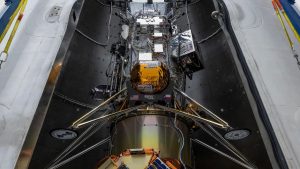‘They need to get real’: Airlines slammed for betting on alternative fuels to reduce emissions
FARNBOROUGH, England — Airline executives at Britain’s Farnborough International Airshow are betting on the use of so-called sustainable aviation fuels to reduce their climate impact, saying the technology is already available and can eventually be scaled up to help the industry reach net-zero emissions by 2050.
Campaigners are urging them to “get real,” however, dismissing the plans as “completely unrealistic” on current growth pathways. Instead, demand management measures are seen as the most effective way for the aviation industry to reduce its near-term climate impact.
That comes as leaders in the aerospace and defense industry gather in extreme heat at the Farnborough International Airshow, the U.K.’s first major air show since the beginning of the Covid pandemic.
The five-day trade exhibition, which began on Monday, has seen thousands of attendees gather in southern England to discuss the future of aviation.
Compared with other sectors, aviation is a relatively small contributor to global greenhouse gas emissions. However, it is recognized as one of the fastest-growing — and the number of flights is expected to grow at an alarming rate over the coming decades.
Read more
If aviation is to align itself with the landmark Paris climate accord and curb global heating, the industry will need to move away from fossil fuels completely in the long term.
One of the ways that the sector is seeking to replace conventional fossil jet fuel is by exploring the use of sustainable aviation fuels, or SAF.
Chris Raymond, chief sustainability officer at Boeing, believes SAF will be a “necessary component” in helping the industry get to net-zero emissions by the middle of the century. “It’s not a bridge,” Raymond said at a press briefing on Monday. “SAF is required. It’s SAF and whatever else we can do.”
Reflecting on Boeing’s outlook for SAF through to 2050, Raymond said, “These pathways to make these fuels will get better and cleaner as there’s more renewable electricity [and] as the hydrogen source becomes more renewable because we’re making it more often with electrolysis and renewable energy grids.”
“This is a spectrum that is driving great innovation right now — and it is all SAF,” Raymond said. “Think of it as the early days of SAF all the way to the hypothetical pure [power-to-liquid) SAF, made with nothing but green hydrogen from renewable electricity and direct air carbon capture.”
Not all alternative fuels are created equal
Sustainable aviation fuels, or SAF, are energy sources “made from renewable raw material,” according to aircraft maker Airbus. It says the most common feedstocks “are crops based or used cooking oil and animal fat.”
There are major concerns in some quarters that increased uptake of SAF could, among other things, result in substantial deforestation and create a squeeze on crops crucial to food production.
“The main thing to bear in mind that is not all SAF are created equal, and their sustainability fully depends on the sustainably of the feedstock that they are made from. With SAF, the devil is really in [the details],” Matteo Mirolo, aviation policy officer at Transport & Environment, told CNBC via telephone.
“The first thing that we’re looking for, and I’m especially thinking about airlines, is a recognition that the credibility of their SAF plans depends on making the right choices when it comes to the kind of SAF or the kind of feedstock that they are made from,” Mirolo said.
Read more
European lawmakers narrowly voted earlier this month to bar the use of controversial biofuel feedstocks from the EU’s aviation fuel green mandate, known as ReFuelEU. The decision was welcomed as a positive step toward decarbonizing the sector and improving the credibility of the bloc’s climate plans.
“My view on this is we should be going as fast as we can to introduce sustainable aviation fuels now, to ramp up this industry now. This is really a very good opportunity to reduce carbon emissions at the beginning of the 30-year tranche we are talking about,” Airbus CEO Guillaume Faury said Monday at a panel at the Farnborough International Airshow.
Faury said the initial pivot to sustainable aviation fuels would likely rely mainly on bio-based aviation fuels, but that they would eventually be replaced by “more sophisticated” power-to-liquid fuels, or e-fuels.
“Probably in the long run — in many decades — we will find a very optimized way of sustainable energy but in the transition, the fast way is to use the SAF, and they are available now,” Faury said.
Huge increase in emissions ‘just not viable’
Norman Baker, campaigns and policy advisor at Campaign for Better Transport, was unequivocal in his message to airline executives betting on SAF to reach net-zero emissions by 2050.
“They need to get real,” Baker told CNBC via telephone. “I don’t believe SAF are sustainable. It is a term used by the industry just like when tobacco companies talked about low-tar cigarettes.”
One of the core problems of relying on SAF to reduce the climate impact of aviation in long term, campaigners say, is that it allows the industry to continue growing at rates incompatible with the deepening climate crisis.
“Even if alternative fuels do develop as planned, and even if the prices do drop and availability increases, the idea that they are going to be available to allow the industry to carry on its current growth pathway is completely unrealistic,” Alethea Warrington, campaigner at climate charity Possible, told CNBC via telephone.
“It is just not viable to have a huge increase in emissions now and hope that you can magically fix this in a couple of decades’ time,” Warrington said. “It is just not going to work.”




